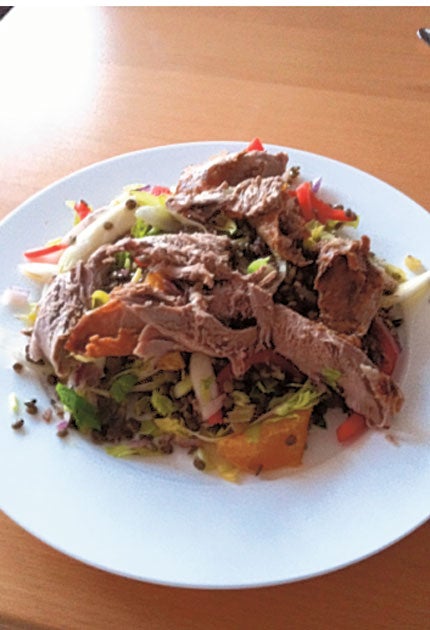Rhodri Marsden: A Twitpic of my dinner – but do I own the rights?

On Sunday I took a photo of my dinner and I posted it on the internet. Yeah, I know. An improvised salad featuring some roast duck, chicory, oranges and lentils (right), it left me feeling sufficiently proud to want to show it off to any online passers-by.
But opinion was divided. A handful of people asked if they could come round to dinner, but some bloke called Lee wasn't so keen. "That looks like a right mess," he said. "It looks like a kebab, and some salad. And you're trying to pass it off as duck." Lee was probably right; the image wasn't picked up by the mainstream media and I wasn't offered a spot on Saturday Kitchen. Plus ça change.
In the unlikely event that that picture ever found its way into a food magazine, would I be credited, or even paid? It's a far from clear-cut issue.
Phones these days are equipped with camera apps that can automatically upload your pictures to the web using a range of default services – including Twitpic, yFrog, Lockerz and Instagram – so that you can easily share them with friends and family.
Sharing those pictures with publications which would normally pay for picture content isn't supposed to be part of the deal, but thanks to terms and conditions that are either vague or unfavourable to the person who took the picture, that's precisely what's been happening.
Last year, the photographer Daniel Morel used Twitpic to upload 13 images he'd taken of the aftermath of the Haitian earthquake, only to find they were being sold by a French picture agency without his permission.
The picture agency claimed it was in the right and sued him; Mr Morel then countersued the agency, and a handful of other organisations which had also used the pictures. ABC and CBS have settled with Mr Morel out of court, but a number of other cases rumble on.
In the meantime, bloggers have pored over the terms and conditions of a number of these sites to establish exactly what our rights are. All services are at pains to tell us that we "own" the pictures that we've taken. Yet it is hard to fathom what ownership actually means when the terms to which we blindly agree often grant the service the right to license our pictures and to profit from them – in some cases even after we've deleted said pictures from our account. With the proliferation of celebrities now using the same services to upload snaps, one organisation in particular has been swift to capitalise on their potential value.
World Entertainment News Network (Wenn), which is based in London, has struck deals in the past with Plixi (now Lockerz) and more recently with Twitpic to formalise the way in which shared pictures are sold on to the media.
They have, thus far, been magnificently uninterested in this picture of my dinner, but if I were famous it's conceivable that they would have been. Any cash, however, just gets shared between Wenn and the picture service.
Do we care about this? If we found ourselves in the middle of a breaking news story and took pictures that found their way into a newspaper or onto television, many of us would be delighted that we'd been part of the news-gathering process. Others would be disgruntled. Some would be angry, but barely anyone would consider incurring the expense and hassle of legal action.
It is possible, however, to make an educated decision about sharing your pictures online. Upload them to Flickr, and you can assign various permissions to your photos, depending on how you feel about the issue. If you feel the pictures are of genuine value, citizenside.com sells pictures on to the media and gives you a 65 per cent split.
If you'd rather not spend any time worrying about it, but would rather your pictures were hosted by a service that has categorically stated that it doesn't sell pictures on, maybe try Mobypicture, which seems to be carving out a righteous niche for itself while the debate continues.
Ultimately, however, services that we use for free will always have to find ways of making some money. Or, in the words of a wise sage called blue_beetle on the site MetaFilter: "If you're not paying for it, you're not the customer; you're the product being sold."
Join our commenting forum
Join thought-provoking conversations, follow other Independent readers and see their replies
Comments
Bookmark popover
Removed from bookmarks